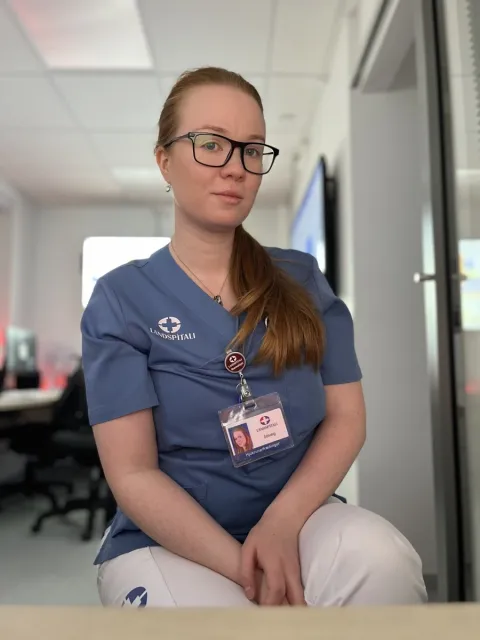

- Are you interested in furthering your education?
- Do you want to develop your knowledge and skills to meet societal demand?
- Do you want a programme that you can complete alongside work?
This is a 30 ECTS micro-credential programme in specialised nursing open to students who have completed a BS in nursing.
Specialisations vary from year to year, since they are organised to align with current societal demand for nurses in specific areas.
Programme structure
The programme is 30 ECTS and is organised as one or two years of part-time study.
There are two available specialisations:
- Nursing management and leadership
This programme allows students to develop their knowledge, understanding and skills in management and leadership within nursing and healthcare, preparing them to work as leaders and managers in nursing.
- Nursing in healthcare clinics with a focus on breastfeeding support
This programme allows nurses and midwives to develop their knowledge and skills in breastfeeding support. Students will acquire evidence-based knowledge of breastfeeding-related subjects, from the biology and physiology of breastfeeding to specialised knowledge of the various challenges that can arise. Particular emphasis is placed on a holistic view of the health of the mother, the child and the family, factors that influence successful breastfeeding, and communication skills for breastfeeding support.
Main objectives
The micro-credential is designed to give students opportunities to develop their knowledge and skills in line with societal impact demand for nursing specialists.
Organisation of teaching
This programme is taught in Icelandic and most textbooks are in English.
Attendance is compulsory for most mandatory courses.
Other
Further information about the programme
Students may apply to have some credits transferred from the micro-credential to another Master’s level programme, in accordance with other admission requirements and the structure of their chosen specialisation.
Bachelor's degree in nursing or a similar program with a minimum grade point average of 6.5 and an Icelandic nursing license. At the same time, the student must have good Icelandic and English skills. Teaching takes place in Icelandic.
Courses in micro-credential studies must be at master's level and meet the requirements for that. A part-time study does not end with a recognized university degree, but a student who completes such a program receives a certified certificate to that effect and can apply to have it evaluated as a shortening of a graduate study. The minimum grade in micro-credential courses must be 6.0. The length of a micro-credential study is usually one to two years, but the study as a whole must be completed within three years. The students' learning speed must be in accordance with the advertised curriculum and course availability.
- CV
- Reference 1, Name and email
- Reference 2, Name and email
- Certified copies of diplomas and transcripts
- Proof of English proficiency
Further information on supporting documents can be found here
Programme structure
Check below to see how the programme is structured.
- First year
- Fall
- Skills for theoretical work
- Epidemiology and control of infectious diseases
- Spring 1
- infection control and infectious disease nursing
Skills for theoretical work (HJÚ140F)
The aim of this course is to enhance the students‘ skills in applying knowledge to their nursing practice. The spotlights is obtaining literature from databases and literature assessment. Evidence-based practice is introduced such as use of clinical guidelines and best practice guidelines. The main focus is on practicing methods for searching for and assessing scientific material as well as developing good text.
Epidemiology and control of infectious diseases (HJÚ162F)
The course aims to introduce nurses to infectious disease epidemiology and methods to measure and control the spread of infectious diseases; laws and regulations that govern/affect/regulate public health responses to infectious disease spread; and immune activation following infection or vaccination.
The course will give an overview of infectious disease epidemiology, it's history and common concepts within the discipline. Students will be introduced to the concept of causality, epidemiological research methods and measures used to define and assess the spread of infectious diseases. There will be a discussion on statistical methods in epidemiology, identifying biases in research and how to avoid them. The course will cover epidemics, outbreak investigations or monitoring of infectious disease incidence. Students will also be introduced to laws and regulations pertaining to infectious diseases; roles of public institutions like the Chief Epidemiologist, Department of Civil Protection and Emergency Management and other institutions that respond to public health emergencies; and ethical issues related to mandated infection control. Finally, students will be introduced innate and adaptive immune activation in response to infections and vaccinations.
Teaching will be offered onsite and remotely depending on students circumstances and/or status of the Covid-19 pandemic.
infection control and infectious disease nursing (HJÚ344F)
The purpose of the course is to increase students' knowledge of the basics of infection control, major infectious diseases and nursing treatment.
The course will deepen students' knowledge and increase the ability to reduce the spread of microorganisms within the healthcare institution. All aspects of basic infection control and isolation precaution will be covered and aseptic procedures will be taught. The course focuses on introducing students to resistant bacteria, methods for stopping their spread inside and outside the institutions and the role of nurses in antibiotic stewardship. The main infectious diseases and infections and the subjects of nurses related to them will be covered. As there is an increase in travel between continents and an increase in the group of individuals with other cultural backgrounds, special attention will be paid to nursing in connection with cultural competence.
It is assumed that teaching can take place in both distance and on-site learning depending on the students' circumstances. A variety of teaching methods will be used. Most of the teaching will be in the form of lectures, but emphasis will be placed on connecting the theoretical part with real-life examples, e.g. with presentations from experts in the field of infection control and infectious diseases. Students' active participation in lessons, skills centers, discussion meetings and projects related to the course topics is expected. Emphasis will be placed on criticism and reflecting on working methods.
- Second year
- Fall
- Not taught this semesterClinical microbiology
Clinical microbiology (LYF307M)
The course addresses the causes of infectious diseases. It covers the characteristics and differences of bacteria, viruses, fungi, and parasites, along with practical laboratory training in microbiology. The symptoms of major infectious diseases, as well as their prevention and treatment, are discussed. The mechanisms of action of the main classes of antibiotics and the development of antibiotic resistance are reviewed.
- Fall
- HJÚ140FSkills for theoretical workMandatory (required) course2A mandatory (required) course for the programme2 ECTS, creditsCourse Description
The aim of this course is to enhance the students‘ skills in applying knowledge to their nursing practice. The spotlights is obtaining literature from databases and literature assessment. Evidence-based practice is introduced such as use of clinical guidelines and best practice guidelines. The main focus is on practicing methods for searching for and assessing scientific material as well as developing good text.
PrerequisitesAttendance required in classHJÚ162FEpidemiology and control of infectious diseasesMandatory (required) course6A mandatory (required) course for the programme6 ECTS, creditsCourse DescriptionThe course aims to introduce nurses to infectious disease epidemiology and methods to measure and control the spread of infectious diseases; laws and regulations that govern/affect/regulate public health responses to infectious disease spread; and immune activation following infection or vaccination.
The course will give an overview of infectious disease epidemiology, it's history and common concepts within the discipline. Students will be introduced to the concept of causality, epidemiological research methods and measures used to define and assess the spread of infectious diseases. There will be a discussion on statistical methods in epidemiology, identifying biases in research and how to avoid them. The course will cover epidemics, outbreak investigations or monitoring of infectious disease incidence. Students will also be introduced to laws and regulations pertaining to infectious diseases; roles of public institutions like the Chief Epidemiologist, Department of Civil Protection and Emergency Management and other institutions that respond to public health emergencies; and ethical issues related to mandated infection control. Finally, students will be introduced innate and adaptive immune activation in response to infections and vaccinations.
Teaching will be offered onsite and remotely depending on students circumstances and/or status of the Covid-19 pandemic.
The course is taught if the specified conditions are metPrerequisitesAttendance required in class- Spring 2
HJÚ344Finfection control and infectious disease nursingMandatory (required) course8A mandatory (required) course for the programme8 ECTS, creditsCourse DescriptionThe purpose of the course is to increase students' knowledge of the basics of infection control, major infectious diseases and nursing treatment.
The course will deepen students' knowledge and increase the ability to reduce the spread of microorganisms within the healthcare institution. All aspects of basic infection control and isolation precaution will be covered and aseptic procedures will be taught. The course focuses on introducing students to resistant bacteria, methods for stopping their spread inside and outside the institutions and the role of nurses in antibiotic stewardship. The main infectious diseases and infections and the subjects of nurses related to them will be covered. As there is an increase in travel between continents and an increase in the group of individuals with other cultural backgrounds, special attention will be paid to nursing in connection with cultural competence.
It is assumed that teaching can take place in both distance and on-site learning depending on the students' circumstances. A variety of teaching methods will be used. Most of the teaching will be in the form of lectures, but emphasis will be placed on connecting the theoretical part with real-life examples, e.g. with presentations from experts in the field of infection control and infectious diseases. Students' active participation in lessons, skills centers, discussion meetings and projects related to the course topics is expected. Emphasis will be placed on criticism and reflecting on working methods.
The course is taught if the specified conditions are metPrerequisites- Fall
- Not taught this semesterLYF307MClinical microbiologyMandatory (required) course6A mandatory (required) course for the programme6 ECTS, creditsCourse Description
The course addresses the causes of infectious diseases. It covers the characteristics and differences of bacteria, viruses, fungi, and parasites, along with practical laboratory training in microbiology. The symptoms of major infectious diseases, as well as their prevention and treatment, are discussed. The mechanisms of action of the main classes of antibiotics and the development of antibiotic resistance are reviewed.
Face-to-face learningPrerequisitesAttendance required in class
Second year- Fall
- HJÚ140FSkills for theoretical workMandatory (required) course2A mandatory (required) course for the programme2 ECTS, creditsCourse Description
The aim of this course is to enhance the students‘ skills in applying knowledge to their nursing practice. The spotlights is obtaining literature from databases and literature assessment. Evidence-based practice is introduced such as use of clinical guidelines and best practice guidelines. The main focus is on practicing methods for searching for and assessing scientific material as well as developing good text.
PrerequisitesAttendance required in classHJÚ162FEpidemiology and control of infectious diseasesMandatory (required) course6A mandatory (required) course for the programme6 ECTS, creditsCourse DescriptionThe course aims to introduce nurses to infectious disease epidemiology and methods to measure and control the spread of infectious diseases; laws and regulations that govern/affect/regulate public health responses to infectious disease spread; and immune activation following infection or vaccination.
The course will give an overview of infectious disease epidemiology, it's history and common concepts within the discipline. Students will be introduced to the concept of causality, epidemiological research methods and measures used to define and assess the spread of infectious diseases. There will be a discussion on statistical methods in epidemiology, identifying biases in research and how to avoid them. The course will cover epidemics, outbreak investigations or monitoring of infectious disease incidence. Students will also be introduced to laws and regulations pertaining to infectious diseases; roles of public institutions like the Chief Epidemiologist, Department of Civil Protection and Emergency Management and other institutions that respond to public health emergencies; and ethical issues related to mandated infection control. Finally, students will be introduced innate and adaptive immune activation in response to infections and vaccinations.
Teaching will be offered onsite and remotely depending on students circumstances and/or status of the Covid-19 pandemic.
The course is taught if the specified conditions are metPrerequisitesAttendance required in class- Spring 2
HJÚ344Finfection control and infectious disease nursingMandatory (required) course8A mandatory (required) course for the programme8 ECTS, creditsCourse DescriptionThe purpose of the course is to increase students' knowledge of the basics of infection control, major infectious diseases and nursing treatment.
The course will deepen students' knowledge and increase the ability to reduce the spread of microorganisms within the healthcare institution. All aspects of basic infection control and isolation precaution will be covered and aseptic procedures will be taught. The course focuses on introducing students to resistant bacteria, methods for stopping their spread inside and outside the institutions and the role of nurses in antibiotic stewardship. The main infectious diseases and infections and the subjects of nurses related to them will be covered. As there is an increase in travel between continents and an increase in the group of individuals with other cultural backgrounds, special attention will be paid to nursing in connection with cultural competence.
It is assumed that teaching can take place in both distance and on-site learning depending on the students' circumstances. A variety of teaching methods will be used. Most of the teaching will be in the form of lectures, but emphasis will be placed on connecting the theoretical part with real-life examples, e.g. with presentations from experts in the field of infection control and infectious diseases. Students' active participation in lessons, skills centers, discussion meetings and projects related to the course topics is expected. Emphasis will be placed on criticism and reflecting on working methods.
The course is taught if the specified conditions are metPrerequisites- Fall
- Not taught this semesterLYF307MClinical microbiologyMandatory (required) course6A mandatory (required) course for the programme6 ECTS, creditsCourse Description
The course addresses the causes of infectious diseases. It covers the characteristics and differences of bacteria, viruses, fungi, and parasites, along with practical laboratory training in microbiology. The symptoms of major infectious diseases, as well as their prevention and treatment, are discussed. The mechanisms of action of the main classes of antibiotics and the development of antibiotic resistance are reviewed.
Face-to-face learningPrerequisitesAttendance required in class

